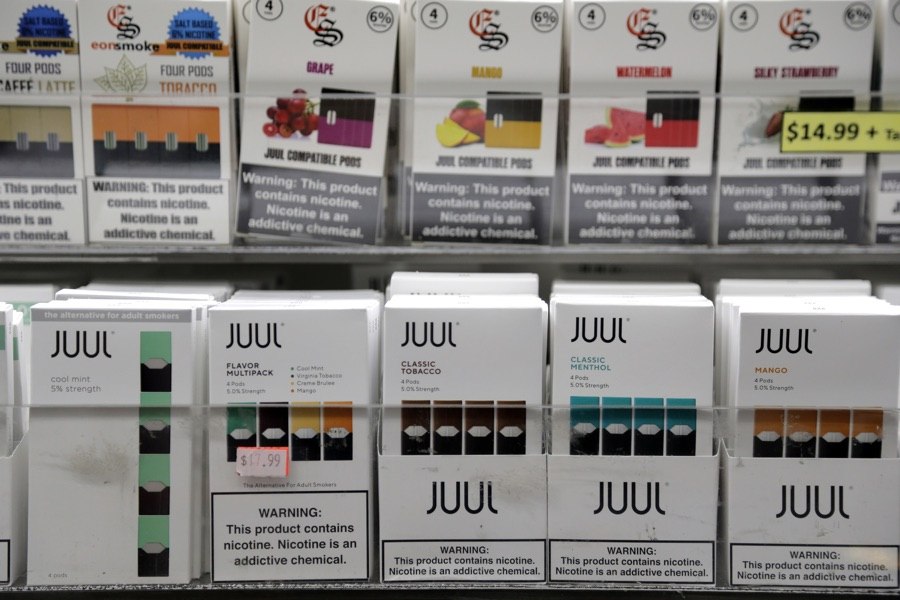Here’s What You Need to Know About Philly’s New Vaping Law
The new law, banning minors from all stores that sell flavored e-cigarettes, will be enforced beginning in July 2020.

The new Philadelphia vape law is set to go into effect in July 2020. Photo by Seth Wenig/AP.
This story has been updated.
As e-cigarette use among young people continues to skyrocket across the United States, more cities and states are beginning to fight back with legislation and lawsuits. In November, Montgomery County district attorney Kevin Steele filed a suit against the e-cigarette manufacturer JUUL — which is currently facing an FDA investigation into its marketing practices — alleging that the company targeted minors in its advertising efforts. School districts around the country have banded together to file similar lawsuits, too.
Meanwhile, last week, Philadelphia City Council took the route of legislative opposition, passing a new law that would limit the availability of e-cigarettes. Other states have already taken similar steps. Two months ago, Rhode Island and Washington each enacted temporary emergency bans of flavored e-cigarettes among the entire adult population. And both Massachusetts and New York City have legislated permanent bans of flavored vape products. By comparison, Philadelphia’s law — a Kenney administration proposal — is considerably more circumscribed: It only targets minors.
So What Does Philly’s Vape Ban Actually Change?
If you’re thinking strictly in terms of the letter of the law, the answer is: not much. It’s already illegal in Philadelphia to sell tobacco products to minors. The problem is that, according to the Department of Public Health, lots of the places that sell e-cigarettes are corner-store-type establishments, which means they could hypothetically let young people in the doors and sell them tobacco products under the table.
With the new legislation, which passed City Council last Thursday, any store that sells flavored e-cigarette products (which tend to be the ones with the highest levels of nicotine) will not be able to admit minors under 18 years of age. Adults will still be able to buy all of the same products.
Currently, there are 2,572 licensed tobacco retailers in Philly. The ones that sell flavored e-cigarettes will have to make a choice: stop selling those specific products but keep their doors open to everyone, or continue to carry everything but limit their clients to those above 18 years old.
The bill’s emphasis on shielding minors is a response to some troubling national trends: A recent study conducted by the CDC found that 28 percent of high schoolers across the country are smoking nicotine e-cigarettes. Just a year ago, the total was 20 percent. And among middle schoolers, the growth has been even shaper: From 2018 to 2019, the percentage of e-cigarette users more than doubled, from 5 to 11 percent. (In Philly, the teen vaping percentage is a much lower 7 percent, which the Health Department attributes to the higher cost of e-cigarette products here.)
What’s the Latest on the Nationwide Vaping Illness Outbreak?
According to the most recent CDC estimates, nearly 2,300 people, from all 50 states, have been hospitalized from a mysterious vaping-related illness. For months, investigators had no idea what was causing the widespread sickness, but they recently had a breakthrough: The culprit appears to be the chemical compound vitamin E acetate, which is typically used as a thickening agent in e-cigarette products. In a recent lab test of 29 people sick with vaping-related lung disease, the CDC found the compound in every single person. (The CDC hasn’t ruled out other potential chemical causes, either.)
The CDC says vitamin E acetate has been found in both e-cigarettes containing nicotine and THC products. Eighty-three percent of the people to fall ill reported they had smoked THC vapes, which are often even less regulated than the already not-well-regulated nicotine e-cigarette market. (Thirteen percent of patients reported only using nicotine.)
The latest demographic breakdown of those to get sick from vaping shows that 78 percent of patients are under the age of 35 years old, while the median age is just 24 years old. The CDC currently recommends that no one smoke or purchase e-cigarette products containing THC.
What Are the Specific Provisions of Philly’s Bill?
Any store that decides it wants to sell flavored e-cigarette products will have to get an “Adults-Only Establishment” license from the Department of Public Health. The department says it will issue these yearlong permits on an annual basis. A spokesperson for Mayor Kenney says he plans to sign the bill by the end of the year. There will be a three-month education period for businesses, followed by three months of warnings. Fines for non-compliance kick in starting in July.
Offenders will face a fine of $250, and if a retailer has been caught more than twice over a two-year period, it will lose its adults-only sales permit.
Are Other Jurisdictions Doing Anything About This?
The Trump administration had made repeated pronouncements in favor of a nationwide ban on flavored e-cigarettes. Then, last month, Trump suddenly changed his mind — apparently due to fear over potential job losses, according to the Washington Post.
Meanwhile, a state representative from Luzerne County introduced a bill in September that would ban flavored e-cigarette products statewide. That bill has yet to see a vote.
Which means that, for now, it looks as if City Council’s bill is going to remain the law of the land.


